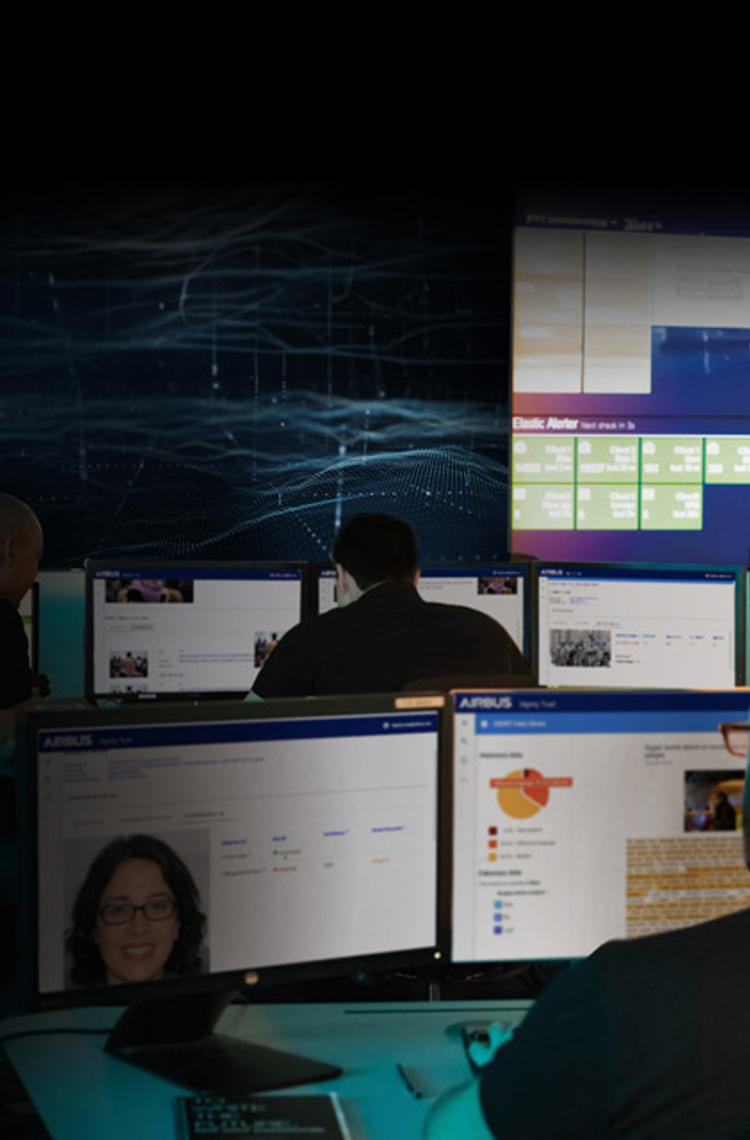Airbus’ cyber and massive intelligence capabilities are helping to combat online disinformation and harmful AI-generated content. The company has developed a demonstrator that trains artificial intelligence algorithms to detect fake news. It is coordinating an EU consortium that will help shape an European Cyber and Information Warfare toolbox.
Multiple posts showing queues of people outside one of Ukraine's main banks, which had allegedly banned withdrawals, combined with the hacking of the same bank's website. Fake news.
A video of Ukrainian President Vladimir Zelensky circulated on social media in March 2022, giving the impression that he was telling Ukrainian citizens to "lay down their arms". An AI-generated, deepfake video
Propaganda goes digital: from disputed elections to the war in Ukraine
Mentioned as far back as the fifth century BC by the Chinese military strategist Sun-Tzu in his book ‘The Art of War’, the concept of propaganda is not new. It’s a form of communication used to promote a particular agenda or perspective, often in a biased, misleading or even false manner.
In recent years, however, information operations have undergone a change of scale, expanding beyond the physical space into the digital realm through the widespread use of the internet and the arrival of social media. Both offer a wealth of opportunities as they have the potential to influence the perception of facts and alter decision making.
The ultimate goal of these disinformation campaigns is to undermine our democratic values and institutions, as well as national, European and international policies
says Charlotte Graire, Sales and Business Development Cyber Defence at Airbus Defence and Space.
Cyber and Information warfare: today’s battlefield
“Today, especially in the context of the hybrid war against Ukraine, influence operations and coordinated disinformation campaigns are targeting citizens of the European Union and the world at large,” warns Graire.
The flagship EUvsDisinfo project has collected and debunked over 16,000 disinformation cases over the last years since 2015
Cyber and Information Warfare [CIW] has fast become one of the most strategic domains in recent conflicts, and is already a priority for NATO and the EU. Airbus Defence and Space teams are already collecting and extracting data to provide intelligence knowledge to Ministries of Defence, NATO and intelligence agencies, including law enforcement forces.
“Through our multi-intelligence tools, we are used to discovering information from open source : social networks, the internet and the deep dark web. For example, we can identify potentially harmful content and transcribe and translate it into any language,” says Guillaume Glorieux, Intelligence project manager at Airbus. “The aim is to provide our customers with a solid base of knowledge and situational awareness to make strategic and tactical decisions in the field.”
Democracy is a system that is based on the information that people have, because they made their choices – their political choices – according to their own perceptions and information that they receive about what is happening in the rest of the world. If the information is toxic their choices are biased [...]. We have to take care of the quality of information because it is the sap, the blood, the oil, the thing that makes democracy work.
Josep Borrel, EU’s High Representative for Foreign Affairs and Security Policy, at this year’s Conference on Foreign Information Manipulation and Interference

For those who combat fake news: Dignity Trust sorts facts from fiction
Using building blocks and expertise from the Intelligence and Cybersecurity teams, Airbus has developed the prototype of the Dignity Trust online platform. This service, based on artificial intelligence and machine learning, brings together all the functions needed to quickly and reliably check the trustworthiness of a media file: an image, video, text, or audio. “It uses synthetic data, information that's artificially generated, to train AI algorithms that can then check the file and return the probability that the file has been tampered with,” explains Enrique Martínez, Innovation Manager in the Airbus Defence and Space Incubators team.
Martinez’ team built the Dignity Trust concept and a demonstrator based on feedback from investigative journalists.
We are at the foothills of the verification industry but surely we need a service to prioritise what information needs further investigation
Will Lewis, former CEO of Dow Jones and Company and publisher of The Wall Street Journal
Journalists would never outsource accuracy! What they need are simple black boxes to automate and speed up their work
Sandy Macintyre, Vice President News, Director Key Initiatives at Associated Press
Following this feedback, the online verification platform was tested with a team of European news agencies.
As well as being used by journalists to combat online disinformation, these capabilities could also be used to protect the privacy of user data on social networks.
“Deepfakes have the potential to be weaponised because they allow you to impersonate anyone,” says Martinez. This was the case in Spain in September this year, with an episode that caused widespread outrage, when the public prosecutor launched an investigation into AI-generated images of naked teenage girls allegedly created and shared by some of their male high school classmates in south-western Spain.
EUCINF: a European toolbox to fight harmful content
The analysis algorithms developed as part of Dignity Trust are being integrated into Airbus’ Massive Intelligence solutions. At the same time, these results were valuable in responding to a call for proposals from the European Defence Funds: the Cyber and Information warfare toolbox (EUCINF - link). This project was awarded in June 2023 to an Airbus-led consortium, consisting of a group of 22 complementary partners from 12 countries, representing nine Ministries of Defence.
As a capability demonstration, EUCINF will implement three operational cyber and information warfare (CIW) scenarios and define precise use cases based on MoD end-user requirements in compliance with legal regulations and societal expectations. Technical specifications of a European CIW toolbox system will be derived from these requirements.
“EUCINF aims to increase European resilience through situational awareness, countermeasures and mission management capabilities against hybrid threats, including foreign information manipulation and interference,” summarises Charlotte Graire.
Security latest news
Continue Reading





